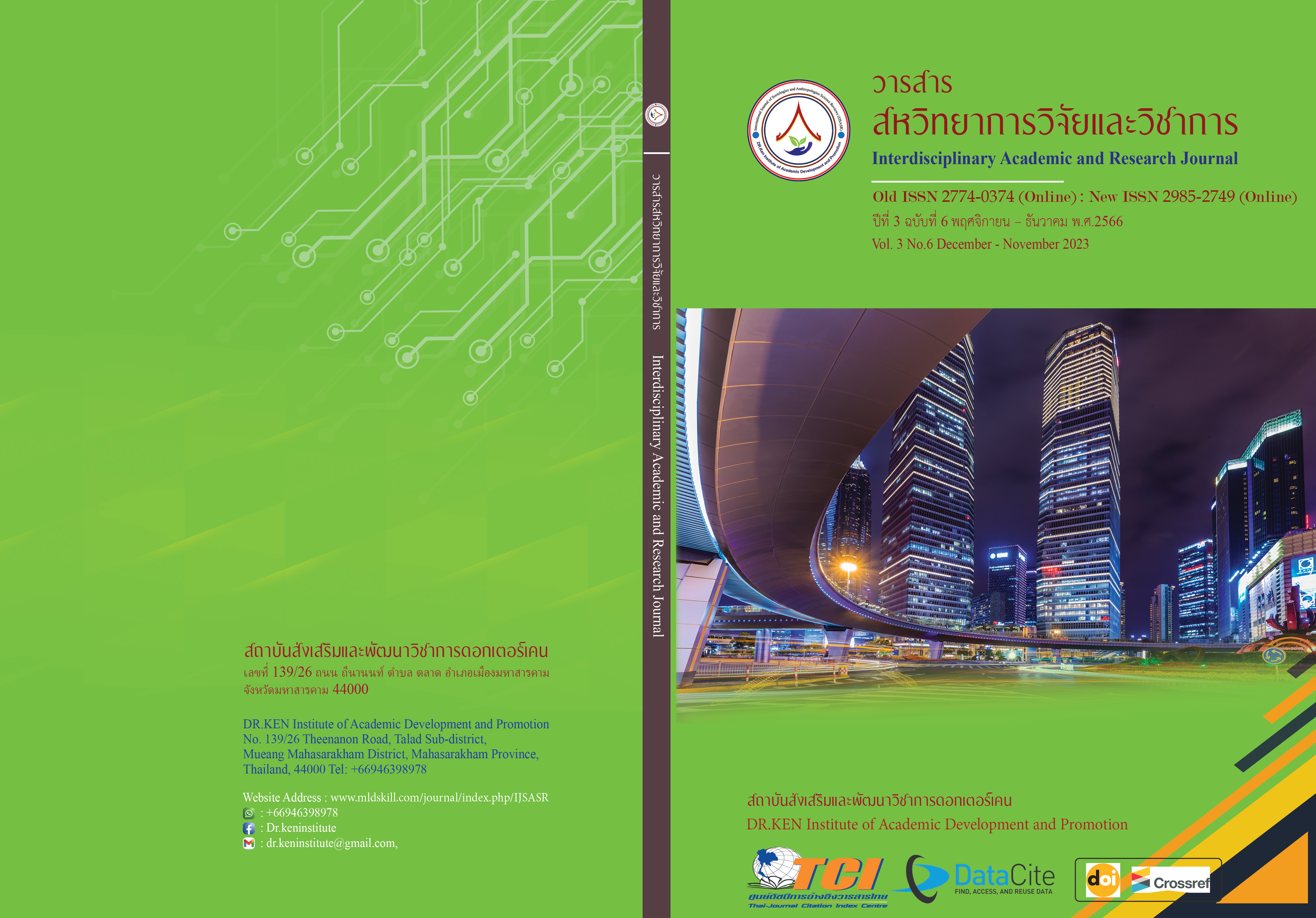The Development of a Training Curriculum to Enhance Critical Thinking Skills for Elementary Teachers at Surin Primary Educational Service Area Office 1
DOI:
https://doi.org/10.60027/iarj.2023.271282Keywords:
Training Curriculum;, Learning Management Ability; , Critical ThinkingAbstract
Background and Aims: Critical thinking are a thinking process that uses reason and careful consideration by studying formation, and evidence, separating information, and finding solutions to problems to make decisions. The objectives of this research were 1) to study basic information, current conditions, and training needs, 2. To develop the training curriculum, 3) to test the training curriculum, and 4) to evaluate the training curriculum and proceed with it by using the research and development procedure.
Methodology: The research is divided into 4 phases. The first one is to study basic information, current conditions, and training needs. A sample group is 136 teachers in the Integrated School Management Network group. The sample group was assigned by using the Krejcie and Morgan table. The target groups used in the interview are 15 elementary school administrators, supervisors, and teachers which are obtained by purposive sampling. Phase 2 is to develop a training curriculum and find efficiency by using 5 experts. Phase 3 is to test the curriculum with 30 teachers in the integrated school management network group. Lastly, phase 4 is to evaluate the training curriculum. The tools are questionnaires and learning management plan assessments. Statistics in data analysis were percentage, mean, and standard deviation.
Results: the results showed that; (1) The overall level of the current state of training to increase the ability to manage critical thinking skills for primary school teachers was at a high level and the overall need for training was at the highest level. (2) The result of developing a training course was found that the training curriculum had 7 components: 1) Background and significance of the problem 2) Principles of the curriculum 3) Objectives of the curriculum 4) Contents of the curriculum 5) Training activities 6) Media and learning resources, and 7) measurement and evaluation. The overall outcome of the curriculum quality assurance was that the highest level of consistency was appropriate. And was at the highest level. (3) the result after the course trial for the 30 participants in the third phase, was found that the teachers who attended the training passed the test, 80 percent out of 100 percent, and they were able to prepare a learning management plan for critical thinking skills at a high-quality level, representing 100 percent. The teachers were also satisfied with the training activities in all aspects at the highest level. And (4) the evaluation results of the training course to enhance learning management capabilities and critical thinking skills for elementary school teachers, showed that the learning management plans of the teachers who attended the training were at the highest level in the overall appropriateness and the opinions of the elementary school students on the teaching and learning management to develop critical thinking skills was at the highest level
Conclusion: the results show that the learning environment for critical thinking skills is at a high level and the training needs are at the highest level. The training curriculum has 7 components that are most consistent and appropriate. Teachers who receive training have 80-100% knowledge and critical thinking abilities and are most satisfied with the training activities. and the evaluation of the training curriculum found that Teachers' learning plans and student opinions are all at the highest level.
References
กระทรวงศึกษาธิการ (2551). หลักสูตรแกนกลางการศึกษาขั้นพื้นฐาน พุทธศักราช 2551. กรุงเทพฯ: โรงพิมพ์ สกสค.
ชญาภา น่าบัณฑิตย์ (2556). รูปแบบการพัฒนาครูด้านกระบวนการสอนคิดอย่างมีวิจารณญาณ โรงเรียนขนาดเล็ก สังกัดสำนักงานเขตพื้นที่การศึกษาประถมศึกษามหาสารคาม เขต 1. วิทยานิพนธ์ครุศาสตรดุษฎีบัณฑิต สาขาการบริหารจัดการศึกษา มหาวิทยาลัยราชภัฏมหาสารคาม.
ชนาธิป พรกุล (2544). การสอนกระบวนการคิด : ทฤษฎีและการนาไปใช้. กรุงเทพฯ: จุฬาลงกรณ์มหาวิทยาลัย.
ทิศนา แขมมณี (2554). ทฤษฎีการเรียนรู้เพื่อพัฒนากระบวนการคิด. กรุงเทพฯ: สำนักงานคณะกรรมการปฏิรูปการศึกษาแห่งชาติ.
ธนศักดิ์ เจริญธรรม (2561). การพัฒนาโปรแกรมพัฒนาครูวิทยาศาสตร์ในการ จัดการเรียนรู้เพื่อส่งเสริมการคิดอย่างมีวิจารณญาณของนักเรียนโรงเรียนมัธยมศึกษา. วิทยานิพนธ์การศึกษาดุษฎีบัณฑิต สาขาวิชา การบริหารและพัฒนาการศึกษา. มหาวิทยาลัยมหาสารคาม.
ธนากร วงศ์ศรีเฝือก (2563). การพัฒนาโปรแกรมเสริมสร้างการจัดการเรียนรู้ของครูเพื่อส่งเสริมการคิดอย่างมีวิจารณญาณของนักเรียนในโรงเรียนประถมศึกษา สังกัดสำนักงานคณะกรรมการส่งเสริมการศึกษาเอกชน. วิทยานิพนธ์การศึกษาดุษฎีบัณฑิต สาขาวิชาการบริหารและพัฒนาการศึกษา. มหาวิทยาลัยมหาสารคาม.
สงัด อุทรานันท์ (2537). พื้นฐานและหลักการพัฒนาหลักสูตร. กรุงเทพฯ: วงเดือนการพิมพ์.
สำนักงานเขตพื้นที่การศึกษาประถมศึกษาสุรินทร์ เขต 1, (2564). แผนปฏิบัติการประจำปี พ.ศ. 2564. สุรินทร์ : กลุ่มนโยบายและแผน สำนักงานเขตพื้นที่การศึกษาประถมศึกษาสุรินทร์ เขต 1.
สำนักงานคณะกรรมการการศึกษาขั้นพื้นฐาน. (2558). แนวทางในการจัดทักษะการเรียนรู้ในศตวรรษที่ 21. กรุงเทพฯ: ชุมนุมสหกรณ์การเกษตรแห่ง ประเทศไทย จำกัด.
สำนักงานเลขาธิการสภาการศึกษา. (2560). ข้อเสนอยุทธศาสตร์การปฏิรูปการศึกษา. กรุงเทพฯ : เซ็นจูรี่.
สิทธิพล อาจอินทร์. (2550). รูปแบบการพัฒนาทักษะการสอนคิดอย่างมีวิจารณญาณ สำหรับครูวิทยาศาสตร์ประถมศึกษา. วิทยานิพนธ์ศึกษาศาสตรดุษฎีบัณฑิต สาขาวิชาหลักสูตรและการสอน มหาวิทยาลัยขอนแก่น.
สุคนธ์ สินธพานนท์ และคณะ (2552). พัฒนาทักษะการคิดตามแนวปฏิรูปการศึกษา. กรุงเทพฯ :เทคนิคพริ้นติ้ง.
สุรางค์ โค้วตระกูล. (2554). จิตวิทยาการศึกษา. พิมพ์ครั้งที่ 12. กรุงเทพฯ : จุฬาลงกรณมหาวิทยาลัย.
สุวิทย์ มูลคํา. (2559). กลยุทธ์การสอนคิดเชิงกลยุทธ์. กรุงเทพฯ : ภาพพิมพ์.
Oliva, P.F. (1992). Developing the Curriculum. 3rd edition. New York: Harper Collins.
Saylor, J.G., & Alexander, M. W. (1994). Planning Curriculum for School. 3rd edition. New York: Holt Rinehart and Winston.
Taba, H. (1978). Curriculum Development: Theory and Practices. New York: Harcourt, Brace and World Inc.
Downloads
Published
How to Cite
Issue
Section
License
Copyright (c) 2023 Suprap Wisitsri, Nattachai Jantachum, Tipaporn Sujaree

This work is licensed under a Creative Commons Attribution-NonCommercial-NoDerivatives 4.0 International License.
Copyright on any article in the Interdisciplinary Academic and Research Journal is retained by the author(s) under the under the Creative Commons Attribution-NonCommercial-NoDerivatives 4.0 International License. Permission to use text, content, images, etc. of publication. Any user to read, download, copy, distribute, print, search, or link to the full texts of articles, crawl them for indexing, pass them as data to software, or use them for any other lawful purpose. But do not use it for commercial use or with the intent to benefit any business.
















.png)


